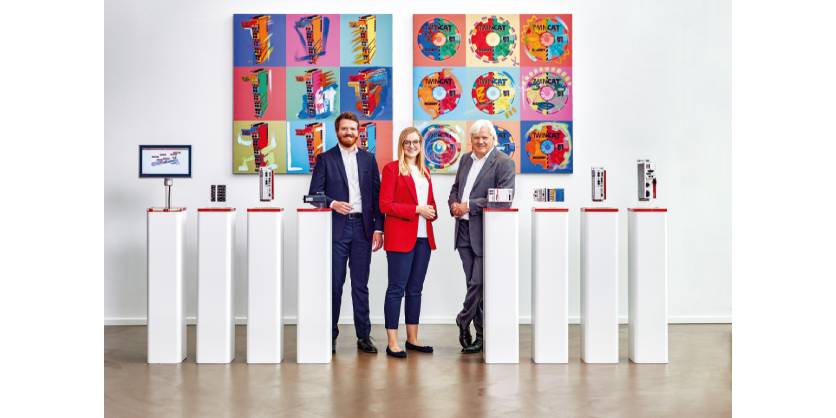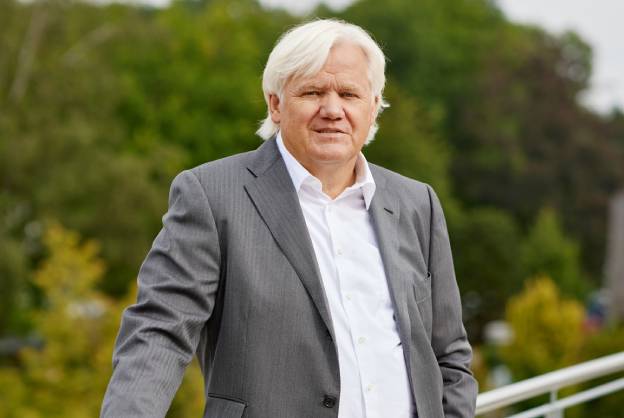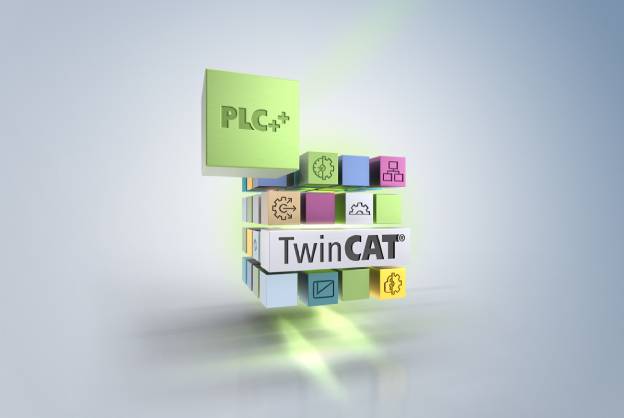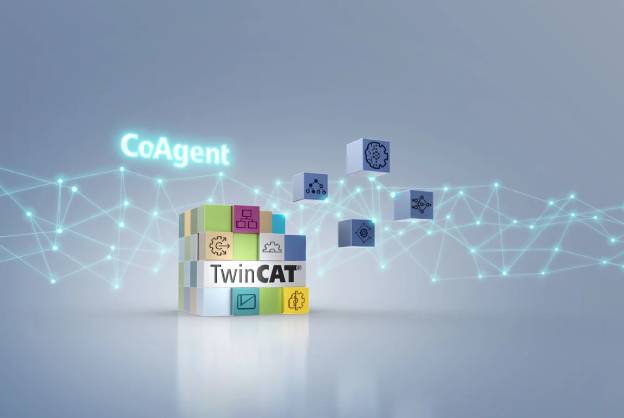On Course for the Future with AI-Powered Automation
November 25, 2025

Despite the economic turbulence the world is experiencing, Beckhoff Automation is heading into the future with a clear innovation agenda, new investments, and stable pricing. At the SPS exhibition, the focus will be on topics such as TwinCAT PLC++, a new multi-touch panel series, industrial PCs with new processors, new EtherCAT Terminals and ASICs, and – most importantly of all – AI integration. Ronald Heinze, editor-in-chief of Open Automation, caught up with Managing Director and owner Hans Beckhoff, along with Frederike Beckhoff (Corporate Development) and Johannes Beckhoff (Product Management), about the latest developments in economic efficiency and technical innovations.
The economy in 2025 has been a rollercoaster for many companies – but for Beckhoff Automation, it has been more up than down and the company is reporting positive figures. “Our sales are up on the previous year, which was a very weak period,” says a delighted Frederike Beckhoff. “We are anticipating growth of between 7% and 10% at the end of the year.” She continues: “The inventory issue has largely been resolved, but we are still in the middle of an economic crisis.”
To cast our minds back, 2023 was a year like no other, with trends driven by one-off effects such as massive build-ups in inventory levels throughout the industry. “That didn’t reflect the real market capacity,” states Frederike Beckhoff. “Customers were hoarding parts because they were in short supply. As a result, in 2024 we had to report a -33% decline compared to 2023. Things aren’t completely a bed of roses now, but 2025 is proving to be healthier,” adds Hans Beckhoff. He points out that 2025 has also been a volatile year to date, with an acceptable start that was followed by a good second quarter and a less-than-favorable third quarter.
It is difficult to forecast how 2026 will look, but Hans Beckhoff is optimistic and hopes to see the same kind of development as this year has shown.
Price stability as a principle
In a time when reports on inflation figures are making headlines, Hans Beckhoff’s attitude seems almost defiant. “Since the company was founded, we have only increased prices a few times,” he states. “We are committed to price stability. Our principle is that we grow through productivity and economies of scale – not through price.” This has continued to be the case in 2025, with no price increases for the company’s customers in its core European markets. Tariff-based surcharges have only come into play in a few export markets, such as the USA.
But where will the next growth spurt come from? “Throughout the world, developments in economic efficiency have been astonishingly even,” reports Frederike Beckhoff. “There is no booming region or countries that have experienced a particular boost.” Smaller countries are an exception to this, however – and, as Hans Beckhoff adds, “Italy has shown very healthy development. Italian machine building has been a remarkably strong industry in 2025, something that has come as a pleasant surprise to us.”

However, the Beckhoff model for success continues to be the breadth of scale on which it operates: “We are winning new customers with exciting projects,” says Frederike Beckhoff. “What’s more, our regular customers have started ordering again after reconciling their stock levels.” As Hans Beckhoff puts it: “It’s better to have a solid foundation in many markets than be dependent on just one.”
The company’s sales trend is also evenly distributed across the product portfolio. “This is due to the fact that around 70% of our customers rely on complete systems from us,” says Hans Beckhoff. According to the Managing Director, industry solutions are a vital part of the business alongside its focus on products, and both areas are being systematically expanded. He highlights the automotive industry when discussing this point. “Both areas open up promising ways of supporting customers.”
Investments: No end in sight
The Verl team simply doesn’t entertain the thought of stopping investments. As Hans Beckhoff puts it: “We are continuing to invest in the same way as always – it’s a part of our DNA.” The company has continued its expansion projects over the course of 2025. Frederike Beckhoff explains what this means right now: “The new building for the Austria branch will be completed, and the team there will move into it, in the first half of 2026. The building complex at the Rheda site in Germany’s East Westphalia region, which has 67,000 m2 of space, will be completed at the end of 2025 and will then be kitted out with interior fittings – providing a basis for even more expansion.”
Work will begin next year on the 20,000 m2 production and office building for the Schirmer Maschinen subsidiary in Verl. Furthermore, production of the ATRO robots and the MX-System will be ramped up at the beginning of next year.
The sales department is continuing to expand at the same time – as Frederike Beckhoff explains: “Around 2,000 of our 5,300 employees worldwide work in sales or in sales-related roles. Personal contact with the customer remains key. “That’s why we continue to build on our sales activities every year – which means geographical, product, and industry sales teams.”
Software: Speed matters – and TwinCAT PLC++ is a game changer
Beckhoff wouldn’t be Beckhoff if it didn’t keep pushing the rate at which things happen. “Speed matters – and that’s always been our motto,” says Johannes Beckhoff. “TwinCAT PLC++ has become a concrete example of faster speeds, and the increase in efficiency that we predicted has materialized. We are becoming 1.5 times faster in many projects – and the execution time is as much as 2.5 times faster in projects with a high degree of optimization.”

Faster control systems also increase the output of machines. Hans Beckhoff explains how this works: “Any time the control cycle time is reduced, the machine has less time to wait before the controller responds. Fractions of a second become percentage points in the efficiency of the machine. And that adds up. Even a 2% gain in speed can have a big impact both economically and environmentally.” Johannes Beckhoff adds: “Completely new machine concepts are also conceivable.”
TwinCAT PLC++ also offers advantages in engineering: faster compile times, shorter online changes, and reduced downtimes. “Efficiency means not only faster production, but also faster commissioning,” states Johannes Beckhoff. Diagnostics are improving too – something that has a big impact on the machinery’s Overall Equipment Effectiveness (OEE).
Another important consideration is that TwinCAT PLC++ was developed in very close harmony with the IEC 61131-3 standard. The excellent compatibility it achieves in this area and the use of high-level languages such as C++ make it possible to establish close links with a wide community of programmers and users.
AI for everyone: Machine Learning Creator
Many businesses keep AI locked in an ivory tower – but Beckhoff wants to bring it into the machine room. TwinCAT Machine Learning Creator provides a tool for exactly this purpose. “It allows the PLC programmer to train a neural network even if they aren’t an AI specialist,” says Johannes Beckhoff. “All they have to do is load a recorded and classified data set into our TwinCAT Machine Learning Creator software, then the training starts automatically – and the neural network is ready to go.”
The implementation started with image analysis. At the SPS, we also show analysis of signals and time series, from vibrations on a milling spindle or pressure curves to process signals. Johannes Beckhoff adds: “This makes it possible to conduct pass/fail assessments of processes and predictive maintenance.”
AI agents make engineering easier
TwinCAT CoAgent provides various agents that use what is known as the Model Context Protocol (MCP). MCP was created specifically for large language models (LLMs) and gives them access to external tools and data sources, making them more effective. According to Johannes Beckhoff, “This protocol appears fairly often in the standard world of large language models – that is, the world of ChatGPT. It’s a kind of standardized interface that describes how a large language model can deterministically access functions of an agent.” MCP was implemented in TwinCAT CoAgent.
“Everything that we intend to develop in TwinCAT, whether that means HMIs, PLCs, analytics, measurement technology functions, or even XPlanar, XTS, or Motion, will be provided with an MCP interface for connectivity with LLMs.” The user can then interact, asking questions such as “Can you create a specific code for me?” and “Can you set an alarm for me?” Johannes Beckhoff adds: “Using the MCP interface, the large language models can access exactly the right function of the automation module in question.”
Hans Beckhoff paints a picture in his usual vivid way: “In the past, a person sat in front of the machine and pulled levers. In the future, there will be something like a little person inside the machine – an LLM – who listens, understands, and takes action.”

This has already been partially demonstrated at the K trade show, where a plastic blow-molding machine featuring the C6043 Industrial PC with NVIDIA® GPU was showcased. The industrial PC not only controls the machine, but also chats and uses artificial intelligence. “We integrate agent-based knowledge everywhere in our TwinCAT tool,” says Johannes Beckhoff, summing things up. In the future, it will be possible to direct even complex queries to a machine using voice input. This will allow the machine to be monitored reliably and enable fault diagnostics.
At the SPS trade show, the focus will be on many other software-themed aspects, such as container-based or virtual control systems and improved motion and vision algorithms.
Hardware offensive: New panels, new processors
“At the SPS, we will be showcasing the CP4xxx and CP5xxx Panel PC series in the Next multi-touch panel generation – the third generation of equipment designs since 1998,” reveals Johannes Beckhoff. The focus will be on cost-optimized solutions, appealing design, and a wide range of formats. Key features of the panel PCs include EtherCAT-based real-time communication, full integration into TwinCAT, high-quality displays with multi-finger touch function, reduced power consumption (especially with the Arm® processors that the PCs include), and industrial components with long-term availability. “The display is the face of the machine – and combines both elegance and machine compatibility,” says Hans Beckhoff.
To ensure the Next multi-touch panel PCs are fit for the future, the electronics concept has been revised and the mechanical and electronic interfaces have been standardized. These robust pieces of equipment, manufactured entirely in-house in Germany, are available as IP20 built-in variants and as IP65 variants for mounting arm installation. A new Arm® multi-core CPU is being offered for the first time – an especially appealing option for price-sensitive visualization tasks. If the panel PCs are also equipped with TwinCAT automation software, the display and control functions can run on the same device.
According to Hans Beckhoff, this provides “an excellent, highly cost-effective introduction to Beckhoff control technology.” The panel PCs don’t just offer classic advantages such as reduced space requirements or less wiring and maintenance work, however. As smart gateways, they are also designed to record and pre-process machine data, then pass it on to higher-level systems.
What’s new in the world of processors? “At Beckhoff, we always have three to four processor classes that we use in our devices. These start with Arm® processors for our small controllers. Then there are the embedded PCs in the CX82xx and CX92xx series, for example, which use more powerful Arm® Cortex® CPUs,” explains Hans Beckhoff. These can also be used for smaller motion control applications.

Next up is the x86 CPU family for more powerful industrial PCs. Beckhoff is introducing new processor lines in this case: “We will be using Intel® Amston Lake with up to eight cores for the compact controllers and Intel® Bartlett Lake for the high-performance systems. That covers an enormous bandwidth,” says Johannes Beckhoff. The new processors will be designed this year and in 2026.
“Our controls are available with Windows and Linux® operating systems as standard,” adds Johannes Beckhoff. “Many customers look for this. Linux® is a widely accepted system,” confirms Hans Beckhoff.
I/O and EtherCAT: Standard – but upgraded
EtherCAT has been part of the Beckhoff success story since 2003 and has become the global standard for industrial communication. “We will be releasing the ET1150, a new ASIC with more memory and improved performance, at the end of the year,” says Johannes Beckhoff. It boasts energy consumption that is as much as four times lower than the ET1100. The new chip is pin-compatible with its predecessor, which will remain available. “It’s great news for device manufacturers, as they can expect a significant boost in performance,” states Hans Beckhoff.
The next highlight concerns the VHDL-based EtherCAT IP core. In this case too, Beckhoff is now offering a new, powerful version that makes it possible to implement EtherCAT functionality in various FPGAs and integrate EtherCAT into specific semiconductor chips. “It offers the same kind of benefits as the new ASIC,” adds Hans Beckhoff.
There are also innovations in EtherCAT Terminals: “We are presenting the ED series of EtherCAT Terminals in a new housing,” says the Managing Director. This equipment features push-in connection technology for simpler wiring, improved thermal properties, and new electronics. “And, of course, the new series is compatible with previous EL terminals.”
Hans Beckhoff assures: “We still supply our very first terminals from 2003 – when EtherCAT was launched on the market – as standard terminals. Even our K-bus terminals from 1995 are still available. Our new ED terminal blocks complement our existing portfolio. We rely on successful continuity.”
Motion: Economy and intelligent handling

The area of motion applications showed intense activity in 2024, and that continues to be the case in 2025. The economy drives for cost-sensitive applications, the third basic drive series in the 300 V and 600 V range, were introduced during the past year. The AX1000 servo drives and AF1000 variable frequency drives have the same form factor. According to Hans Beckhoff, both drive types are “being greeted very enthusiastically by customers thanks to their excellent performance and attractive price.” He summarizes: “Perfect is the enemy of good. Even if it means cannibalizing our own products, we will keep developing.”
In the XTS product transport system, the EcoLine motor module – which creates 45% cost savings per meter – is particularly worth highlighting, as are the stainless-steel variants for hygienic applications. Curved modules for larger radii with 22.5° are available for XTS Hygienic, while larger tiles can be obtained for the XPlanar planar motor system. “With the new software update, the movers can also rotate 360° – anywhere on the surface, even during transport movements,” says Johannes Beckhoff. “It’s kind of like watching a fairground ride,” he laughs.
The long-term tests for the ATRO modular industrial robot construction kit are now coming to an end. According to Hans Beckhoff, the design has been slightly adapted again and the system is now almost ready for series production. Pre-series are expected in the second quarter of next year and series production will start at the end of 2026.
MX-System: Control cabinet-free automation with regular delivery
Beckhoff has started regular delivery of the MX-System. The first machines to be fully equipped with this modular solution are already being used successfully. This marks the start of a new generation of automation systems – without traditional control cabinets, but with maximum efficiency, flexibility, and future-safety. To achieve this, the MX-System combines all automation functions in a pluggable, robust system design and offers machine builders and end users comprehensive benefits over the entire life cycle of the machine.
The MX-System represents a paradigm shift in automation technology. It not only replaces the control cabinet, it redefines it. The combination of modular hardware, standardized interfaces, and integrated intelligence creates the basis for future-proof, flexible machine concepts. The technology is suitable for a wide range of uses, from packaging technology and building construction to the food and automotive industries. Beckhoff provides its customers with comprehensive support ranging from project planning and training to series integration. If desired, the Beckhoff specialists will even demonstrate how the MX-System can become the optimum solution for an automation task in individual customer applications.
Moving into the future with momentum
For many companies, the EU Machinery Regulation, Cyber Resilience Act, and NIS2 Directive are the stuff of nightmares. Hans Beckhoff remains pragmatic, however: “These are binding regulations and they do have elements that make sense. We are working on the necessary certifications and staying in close communication with our customers. It is important that Europe is strengthened by these regulations, not weakened.” Of course, he adds, it goes without saying that Beckhoff Automation will continue to deliver on time: “Our customers need to be able to rely on us.”
Last but by no means least, the question of which adaptation is bringing customers the most benefit comes up. Hans Beckhoff chooses the MX-System: “It affects everyone who builds and uses control cabinets. It marks a radical change in automation practices – and it’s happening here and now.”
Johannes Beckhoff, on the other hand, is banking on AI: “The hype is justified. LLMs will profoundly change the engineering, commissioning, and operation of machines. We have to be at the forefront of this movement.” This is what will propel software into the future, he believes.
What do the Beckhoffs expect from the SPS 2025 show? Hans Beckhoff replies with a smile: “Great business opportunities, great conversations – and, most importantly, a great party.” The Verl team is staying true to themselves, with a culture that is down-to-earth, innovative, and charming. A family business that is rethinking the future of automation between their MX-System and AI. Hans, Frederike, and Johannes Beckhoff are keeping the family business on course together with the input of around 5,300 employees worldwide. Between stable prices, bold investments, and visionary technologies, the family-owned company is continuing to benefit from a tailwind that will help them sail into 2026 and beyond.
More Information
Related Story
Hans Beckhoff Receives the Rudolf Diesel Medal for Most Successful Innovation Achievement
Hans Beckhoff, Managing Director and founder of Beckhoff Automation, a technology company headquartered in Verl, was honored with the widely acclaimed Rudolf Diesel Medal 2025. Hans Beckhoff received this prestigious award in the Most Successful Innovation Achievement category at the award ceremony held at the MAN Museum in Augsburg on July 10. This medal honors him as a visionary pioneer in automation technology.




